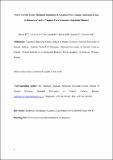| dc.contributor.author | Carleton, Laura A. | |
| dc.contributor.author | Doyle, Karen M. | |
| dc.contributor.author | Samali, Afshin | |
| dc.contributor.author | Gorman, Adrienne | |
| dc.contributor.author | Mnich, Katarzyna | |
| dc.contributor.author | Kavanagh, Edel T. | |
| dc.date.accessioned | 2016-01-21T12:35:21Z | |
| dc.date.available | 2016-01-21T12:35:21Z | |
| dc.date.issued | 2014-05-01 | |
| dc.identifier.citation | Mnich, K,Carleton, LA,Kavanagh, ET,Doyle, KM,Samali, A,Gorman, AM (2014) 'Nerve growth factor-mediated inhibition of apoptosis post-caspase activation is due to removal of active caspase-3 in a lysosome-dependent manner'. Cell Death & Disease, 5 . | en_IE |
| dc.identifier.issn | 2041-4889 | |
| dc.identifier.uri | http://hdl.handle.net/10379/5469 | |
| dc.description.abstract | Nerve growth factor (NGF) is well characterised as an important pro-survival factor in neuronal cells that can inhibit apoptotic cell death upstream of mitochondrial outer membrane permeabilisation. Here we addressed the question of whether NGF can also protect against apoptosis downstream of caspase activation. NGF treatment promoted a rapid reduction in the level of the p17 subunit of active caspase-3 in PC12 cells that had been induced to undergo apoptosis by various cytotoxins. The mechanism involved TrkA-dependent activation of extracellular signal-regulated kinase (ERK1/2) but not phosphatidylinositol 3-kinase (PI3K)/Akt, and de novo protein synthesis. Involvement of inhibitor of apoptosis proteins (IAPs) and proteasomal degradation were ruled out. In contrast, inhibition of lysosome function using chloroquine and concanamycin A reversed NGF-induced removal of p17. Moreover, in NGF-treated cells, active caspases were found to be localised to lysosomes. The involvement of macroautophagy and chaperone-mediated autophagy were ruled out. Taken together, these findings suggest an anti-apoptotic mechanism by which NGF induces removal of active caspase-3 in a lysosome-dependent manner. | en_IE |
| dc.description.sponsorship | Science Foundation Ireland (Grant No. 09/RFP/BMT2153), Irish Research Council for Science, Engineering and Technology (EMBARK scholarships), Breast Cancer campaign, UK (Grant number 2008NovPhD21), Thomas Crawford Hayes fund, School of Natural Sciences, NUI Galway, Ireland, Beckman fund, School of Natural Sciences, NUI Galway, Ireland | en_IE |
| dc.format | application/pdf | en_IE |
| dc.language.iso | en | en_IE |
| dc.publisher | Nature Publishing Group | en_IE |
| dc.relation.ispartof | Cell Death & Disease | en |
| dc.rights | Attribution-NonCommercial-NoDerivs 3.0 Ireland | |
| dc.rights.uri | https://creativecommons.org/licenses/by-nc-nd/3.0/ie/ | |
| dc.subject | Apoptosis | en_IE |
| dc.subject | Autophagy | en_IE |
| dc.subject | Caspases | en_IE |
| dc.subject | Lysosomes | en_IE |
| dc.subject | Nerve growth factor (NGF) | en_IE |
| dc.subject | Cytochrome-c release | en_IE |
| dc.subject | Programmed cell-death | en_IE |
| dc.subject | Sympathetic neurons | en_IE |
| dc.subject | Phosphatidylserine exposure | en_IE |
| dc.subject | Pheochromocytoma cells | en_IE |
| dc.subject | Tyrosine kinase | en_IE |
| dc.subject | Ligase activity | en_IE |
| dc.subject | Mitochondria | en_IE |
| dc.subject | Degradation | en_IE |
| dc.subject | Autophagy | en_IE |
| dc.subject | Biochemistry | en_IE |
| dc.title | Nerve growth factor-mediated inhibition of apoptosis post-caspase activation is due to removal of active caspase-3 in a lysosome-dependent manner | en_IE |
| dc.type | Article | en_IE |
| dc.date.updated | 2016-01-21T11:57:57Z | |
| dc.identifier.doi | 10.1038/cddis.2014.173 | |
| dc.local.publishedsource | http://dx.doi.org/doi:10.1038/cddis.2014.173 | en_IE |
| dc.description.peer-reviewed | peer-reviewed | |
| dc.contributor.funder | |~| | |
| dc.internal.rssid | 6679296 | |
| dc.local.contact | Adrienne Gorman, Biochemistry, School Of Natural Science, Bioresearch Building, Nui. 2417 Email: adrienne.gorman@nuigalway.ie | |
| dc.local.copyrightchecked | No | |
| dc.local.version | ACCEPTED | |
| nui.item.downloads | 417 | |


